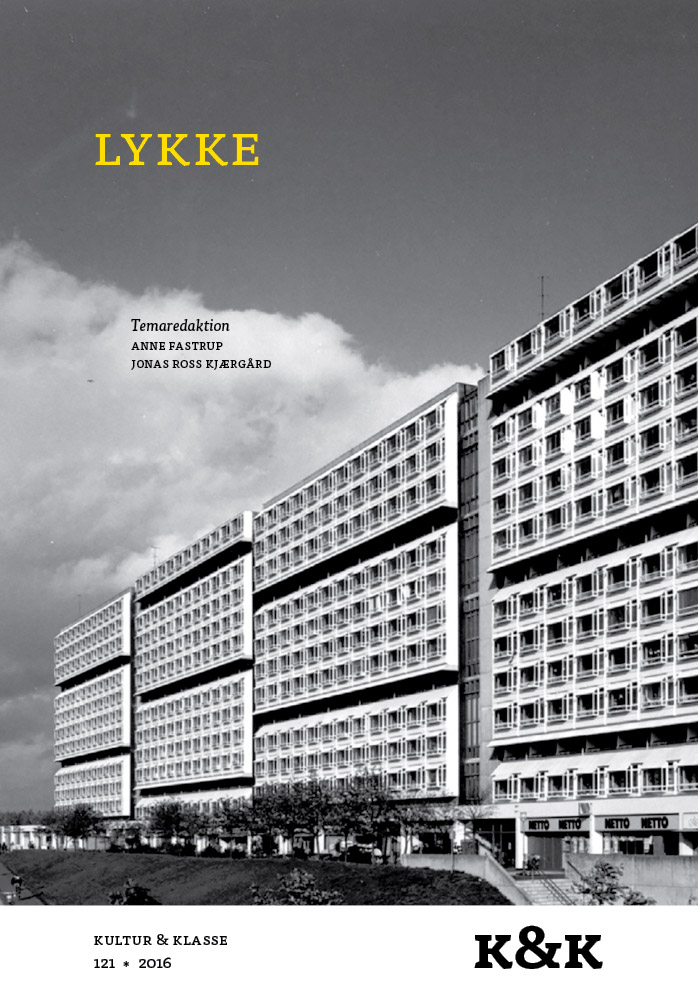Lyckans administration
DOI:
https://doi.org/10.7146/kok.v44i121.23725Nøgleord:
happiness, administration, Polizeywissenschaft, Bildung, individualization, Goethe, Wilhelm Meisters LehrjahreResumé
This article engages in the new concept of individual happiness that spread in the 18th Century and in Goethe’s pivotal novel Wilhelm Meisters Lehrjahre (1795–96). In this novel, the process of “Bildung” is designed to lead the protagonist to happiness, but happiness turns out to be possible only if the process can be governed from the outside, by powers alien to the subject. For this reason, the article argues that the notion of happiness orchestrated in the novel is not based on a revolutionary concept of happiness or a victorious Enlightenment critique, but on a concept derived from a more local field of knowledge, namely “Polizeywissenschaft”. Central to German state reform, and the practices of local administration in the late 18th Century, “Polizeywissenschaft” was developed in order to render happiness to both states and individuals, and it did so by means of surveillance and secret intervention in everyday life. On a theoretical level, the breakthrough of ”the police” during the century could be mapped as an outcome of the transition from a sovereign power regime to a biopolitical one, in Michel Foucault’s teminology. In Wilhelm Meisters Lehrjahre, as in the biopolitics encoded in the “Polizeywissenschaft,” the experience of happiness is thus coupled with a new way of governing life as such.
Referencer
Ahmed, Sara. The Promise of Happiness. Durham & London: Duke University Press, 2010.
Blum, Carol. Strength in Numbers: Population, Reproduction and Power in Eighteenth-Century France. Baltimore: Johns Hopkins UP, 2002.
Bruckner, Pascal. L’Euphorie perpétuelle. Essai sur le devoir de bonheur. Paris: Grasset et Fasquelle, 2000.
Eriksson, Birgit. Moderne dannelse. Goethes Wilhelm Meister og dannelseromanens aktualitet. Aarhus: Aarhus universitetsforlag, 2013.
Fichte, Johann Gottlieb. Grundlage des Naturrechts nach Principien der Wissenschaftslehre. Fichtes Werke. Red. Emanuel Hermann Fichte. Bd 3. Berlin: Walter de Gruyter & Co, 1971 [1798].
Fischer, Katrin. ”Die Turmgesellschaft in Wilhelm Meisters Lehrjahre. Eine Deutung under Bezug auf Goethes Einstellung gegenüber Telelologie und im Kontext der Frage was ein gelungenes Leben gewährleistet”. Web 29 marts 2016. http://www.goethezeitportal.de/db/wiss/goethe/meisterslehrjahre_fischer.pdf
Foucault, Michel. ”Politisk individteknologi”. Diskursernas kamp. Texter i urval av Thomas Götselius & Ulf Olsson. Eslöv: Brutus Östlings bokförlag Symposion, 2008. 293–308.
Foucault, Michel. Sexualitetens historia I. Viljan att veta, Stockholm: Gidlund, 1980.
Foucault, Michel. Säkerhet, territorium, befolkning. Collège de France 1977–1978. Stockholm: Tankekraft, 2010.
Foucault, Michel. ”Varför studera makten: frågan om subjektet”. Postmoderna tider. Red. Mikael Löfgren. Stockholm: Norstedts, 1986. 175–186.
Frevert, Ute. Emotions in History: Lost and Found. New York: Central European University Press, 2011.
Goethe, Johann Wolfgang von. Wilhelm Meisters läroår, 1–2. Stockholm: Bonnier, 1931 [1794–95].
Goethe, Johann Wolfgang von. Wilhelm Meisters Wanderjahre, Werke. Hamburger Ausgabe, Bd. 8, München: C.H. Beck, 1982 [1829].
Guden, Peter Philipp. Policey der Industrie. Braunschweig: 1768.
Hegel, G. W. F. Vorlesungen über Naturrecht und Staatswissenschaft. Hamburg: Meiner, 1983 [1817–18].
Humpert, Magdalene. Bibliographie der Kameralwissenschaften, Köln: K. Schröder, 1937.
Jung-Stilling, Johann Heinrich. Leehrbuch der Staats-Policey-Wissenschaft. Leipzig: 1788.
Justi, Johann Heinrich Gottlob von. Grundsätze der Polic-Wissenschaft. Göttingen: 1759.
Kittler, Friedrich. Nedskrivningssystem 1800/1900. Göteborg: Glänta, 2013 (1985).
Kittler, Friedrich. ”Ottilie – kapten”, Maskinskrifter. Essäer om medier och litteratur. Red. Otto Fischer & Thomas Götselius. Gråbo: Anthropos, 2003. 125–154.
Kittler, Friedrich. ”Über die Sozialisation Wilhelm Meisters”, Dichtung als Sozialisationsspiel. Red. Gerhard Kaiser & Friedrich Kittler. Göttingen: Vandenhoek & Ruprecht, 1978. 13–124.
Maier, Hans. Die ältere deutsche Staats- und Verwaltungslehre. München: Beck, 1980.
McMahon, Darrin. Happiness: A History. New York: Atlantic Monthly Press, 2006.
Moretti, Franco. The Way of the World: The Bildungsroman in European Culture. London: Verso, 2000 [1987].
Neurath, Wolfgang. ”Regierungsmentalität und Policey. Technologien der Glückseligkeit im Zeitalter der Vernunft”. Österreichiches Zeitschrift für Geisteswissenschaft 11 (2000). 11–33.
Raeff, Marc. The Well-Ordered Police State: Social and Institutional Change through Law in the Germanies and Russia 1600–1800. New Haven: Yale University Press, 1983.
Schnyder, Peter. ”Schillers ’Pastoraltechnologie’. Individualisierung und Totalisierung im Konzept der ästhetischen Erziehung”. Jahrbuch der deutschen Schillergesellschaft 50 (2006). 234–262.
Schäffner, Wolfgang. ”Erfindungskunst. Johan Beckmann und die Technologie der Künste im 18. Jahrhundert”, Das Laokoon-Paradigma. Zeichenregime im 18. Jahrhundert. Red. Inge Baxman. Berlin: Akademie Verlag, 2000. 418–438.
Wolfgang Schäffner, Joseph Vogl. ”Policey-Sachen”, Friedrich Schiller und der Weg in die Moderne. Red. Walter Hinderer. Würzburg: Königshausen & Neumnn, 2006. 47–65.
Stolleis, Michael. Geschichte des öffentlichen Rechts in Deutschland. Bd 1: Reichspublizistik und Polizeiwissenschaft 1600–1800. München: Beck, 1988.
Tribe, Keith. Governing Economy: The Reformation of German Economic Discourse 1750–1840. Cambridge: Cambridge University Press, 1988.
Vismann, Cornelia. Akten. Medientechnik und Recht. Frankfurt am Main: S. Fischer Verlag, 2000.
Vogl, Joseph. ”Staatsbegehren. Zur Epoche der Policey”. Deutsche Vierteljahrschrift für Literaturwissenschaft und Geistesgeschichte, 74 (2000). 600–626.
Wakefield, Andre. The Disordered Police State: German Cameralism as Science and Practice. Chicago: University of Chicago Press, 2009.
Downloads
Publiceret
Citation/Eksport
Nummer
Sektion
Licens
Tidsskriftet følger dansk ophavsret.





